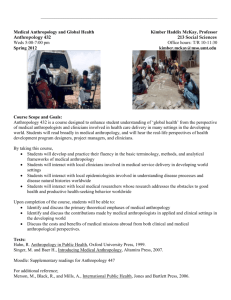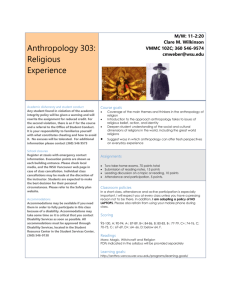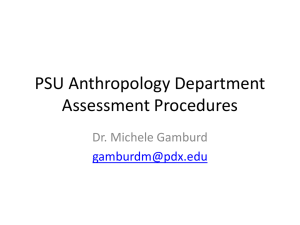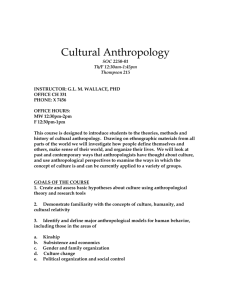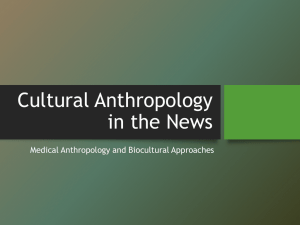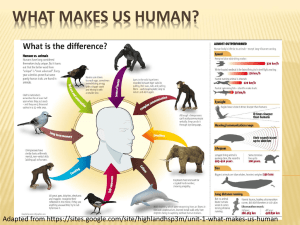Syllabus - Department of Global & Sociocultural Studies
advertisement
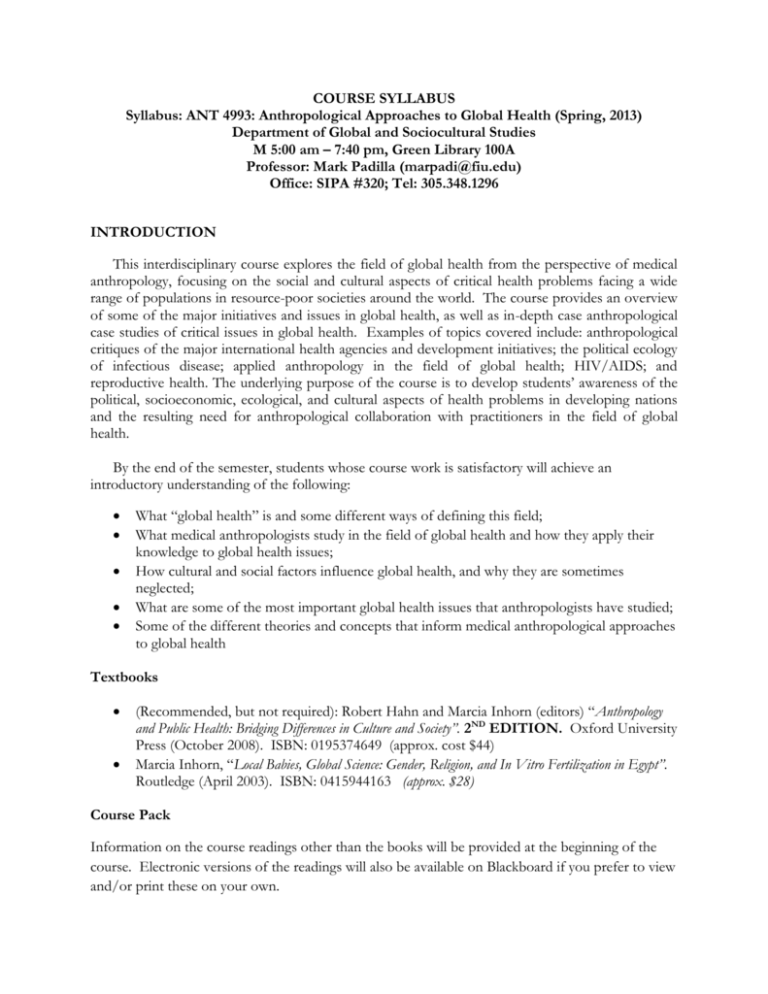
COURSE SYLLABUS Syllabus: ANT 4993: Anthropological Approaches to Global Health (Spring, 2013) Department of Global and Sociocultural Studies M 5:00 am – 7:40 pm, Green Library 100A Professor: Mark Padilla (marpadi@fiu.edu) Office: SIPA #320; Tel: 305.348.1296 INTRODUCTION This interdisciplinary course explores the field of global health from the perspective of medical anthropology, focusing on the social and cultural aspects of critical health problems facing a wide range of populations in resource-poor societies around the world. The course provides an overview of some of the major initiatives and issues in global health, as well as in-depth case anthropological case studies of critical issues in global health. Examples of topics covered include: anthropological critiques of the major international health agencies and development initiatives; the political ecology of infectious disease; applied anthropology in the field of global health; HIV/AIDS; and reproductive health. The underlying purpose of the course is to develop students’ awareness of the political, socioeconomic, ecological, and cultural aspects of health problems in developing nations and the resulting need for anthropological collaboration with practitioners in the field of global health. By the end of the semester, students whose course work is satisfactory will achieve an introductory understanding of the following: What “global health” is and some different ways of defining this field; What medical anthropologists study in the field of global health and how they apply their knowledge to global health issues; How cultural and social factors influence global health, and why they are sometimes neglected; What are some of the most important global health issues that anthropologists have studied; Some of the different theories and concepts that inform medical anthropological approaches to global health Textbooks (Recommended, but not required): Robert Hahn and Marcia Inhorn (editors) “Anthropology and Public Health: Bridging Differences in Culture and Society”. 2ND EDITION. Oxford University Press (October 2008). ISBN: 0195374649 (approx. cost $44) Marcia Inhorn, “Local Babies, Global Science: Gender, Religion, and In Vitro Fertilization in Egypt”. Routledge (April 2003). ISBN: 0415944163 (approx. $28) Course Pack Information on the course readings other than the books will be provided at the beginning of the course. Electronic versions of the readings will also be available on Blackboard if you prefer to view and/or print these on your own. Assessments and Grades - - - - In-class midterm exam (30% of the final grade) : short essays, short answers, and multiple choice questions. The midterm will be an in-class multiple choice and short-answer examination of material covered in class and reading. It will involve multiple-choice, fill-inthe-blank, and short written responses. Chapters assigned in Hahn and Inhorn’s Anthropology and Public Health and readings from the course pack will all be included on the exam, as well as lecture material. In-class final exam (40% of the final grade): covers material since the midterm; short essays, short answers, and multiple choice questions. The final examination will be an inclass multiple choice and short-answer examination. It will focus primarily on material covered in class since the mid-term (i.e., not "comprehensive"), although some fundamental concepts from earlier in the course may be invoked. The format will be the same as the midterm exam. Book review of Inhorn’s Local Babies, Global Science (20% of final grade). Students will write a five-page (no longer), typed, double-spaced book review of Inhorn’s book, “Local Babies, Global Science”. A good book review involves a magical “formula” of the following elements: (1) a compelling introduction (usually a paragraph); (2) a brief description of the book’s subject, location, time frame, and research methodology (another long paragraph); (3) a concise summary of the book’s major themes, theoretical arguments, and key findings; rather than a simple listing of “facts” or ethnographic details presented in the book, this is the heart of the book review and should require 2-3 pages, organized around the book’s major ideas and key themes; (4) a summary of the book’s strengths (1/2-1 page); (5) a critical evaluation of the book’s weaknesses, for example, in methodology, ethnographic richness, flawed development of arguments, etc.(1/2-1 page); and (6) potential audiences for and uses of the book (final paragraph). Please edit your review to make sure that it is well-written and logically constructed. Coverage of the aforementioned elements, as well as clarity of writing, will be considered in grading. This book review is due in hard copy at the beginning of the class period in which the book is to be discussed. Examples of professionally written anthropological book reviews will be posted on the Blackboard site for the course. Attendance (10% of the final grade) Notes on Academic Integrity The faculty of the School of International and Public Affairs and the Department of Global and Sociocultural Studies believes that the conduct of a student registered or taking courses should be consistent with that of a professional person. Courtesy, honesty, and respect should be shown by students toward faculty members, guests (if relevant), administrative support staff, and fellow students. Similarly, students should expect faculty to treat them fairly, showing respect for their ideas and opinions and striving to help them achieve maximum benefits from their experience in the School. Student academic misconduct refers to behavior that may include plagiarism, cheating, fabrication, falsification of records or official documents, intentional misuse of equipment or materials (including library materials), and aiding and abetting the perpetration of such acts. The preparation of reports, papers, and examinations, assigned on an individual basis, must represent each student’s own effort and must not reproduce verbatim previously published material, including from the internet. Reference sources should be indicated clearly. The use of assistance from other students or aids of any kind during a written examination, except when the use of aids such as electronic devices, books or notes has been approved by an instructor, is a violation of the standard of academic conduct. Notes on Attendance: Class attendance in this course and participation during discussions is important. If you are planning or need to miss significant numbers of sessions, you should rethink taking this course. If you have a situation that affects your attendance, you must speak to the Professor right away to make him aware of this and help you to meet your obligations as you are able. In short, we are happy to work with you, but you need to keep us informed and treat course requirements as obligations. Please note: we will track attendance for our own purposes and reserve the right to take this into consideration in end-of-semester grades if there is a significant and consistent attendance problem that has not been justified by the student. READING LIST AND ASSIGNMENT CALENDAR Part I: History of International Health Development and Bureaucracies 1/7: Introduction to Course Themes and Logistics No assigned readings. Review of the course syllabus / discussion of course organization. Definitions of Global Health and the approach taken in this course. 1/14: Role of Anthropologists in Global Health and the Anthropological Approach Topics covered - “International Health” vs. “Global Health”: What do they mean? The role of Anthropologists in Global Health and the Anthropological Approach Readings: Hahn and Inhorn text (“Introduction” in Anthropology and Public Health: Bridging Differences in Culture and Society. Oxford, 2009.) 1/21: The Colonial Roots of Public Health; Global Health as “Culture” Topics covered - History of Public Health and imperialism Primary Health Care and the CPHC vs. SPHC Debate Readings: Hahn and Inhorn text, Chapter 24 Brown, E. Richard (1976), 'Public Health in Imperialism: Early Rockefeller Programs at Home and Abroad', American Journal of Public Health, 66 (9), 897-903. Justice, Judith (1987), “The Bureaucratic Context of International Health: A Social Scientist's View”, Social Science and Medicine, 25: 1301-06. 1/28: Critical Medical Anthropology and the Globalization of Health Topics Covered - What is Critical Medical Anthropology? Readings: Hahn and Inhorn text, Chapter 7 Baer, Hans A., Singer, Merrill, and Susser, Ida (1997), Chapter 2: “Theoretical Perspective in Medical Anthropology.” Medical Anthropology and the World System: A Critical Perspective (Westport, CT: Bergin & Garvey). 2/4: Discussion and readings from Paul Farmer Topics Covered - Paul Farmer and his perspective The application of a structural perspective to health in developing countries Readings: Selection (Part I) from the book Mountains Beyond Mountains: The Quest of Dr. Paul Farmer Paul Farmer, “Pathologies of Power: Rethinking Health and Human Rights”, American Journal of Public Health 89 no.10 (1999), pp.1486-1496. 2/11: Review and Discussion 2/18: Mid-term exam (in class) Part 2: Anthropology and Studies of HIV/AIDS 2/25: “Sexual Culture” and the Global Epidemiology of HIV/AIDS Topics covered: - What is “sexual culture” and how does it affect HIV/AIDS? Readings: Inhorn and Hahn text, Chapter 5 Parker, R. “Within Four Walls”: Brazilian Sexual Culture and HIV/AIDS. In: Sexuality, politics and AIDS in Brazil: in another world? Herbert Daniel and Richard Parker. London, England, Falmer Press, 1993: 65-84 3/4: Guest lecture: Medical Ethics, Stigma, and Social Responsibility (Prof. Nelson Varas-Diaz) Topics covered - The impact of social stigma on health and vulnerability An example of a de-stigmatization intervention with physicians in Puerto Rico Readings: Parker, R. and P. Aggleton (2003). "HIV and AIDS-related stigma and discrimination: A conceptual framework and implications for action." Social Science & Medicine 57(1): 13-24. 3/11: No Class – Spring Break Part 3: Anthropology and Reproductive Health 3/18: The Anthropology of Reproduction Topics covered - How do anthropologists approach issues of human reproduction and reproductive health? Readings: Browner, Carole and Carolyn Sargent (1996). Chapter 11: "Anthropology and Studies of Human Reproduction." In Medical Anthropology: Contemporary Theory and Method. New York: Praeger. Lane, S. D. (1994), 'From population control to reproductive health: an emerging policy agenda', Social Science and Medicine, 39 (9), 1303-14. 3/25: Fertility, Family Planning, and Female Circumcision Topics covered: - Fertility and Family Planning programs in global perspective Female genital cutting as a global human rights issue Readings: Hahn and Inhorn text, chapter 14 4/1: Discussion of Inhorn’s book, Local Babies, Global Science Topics covered: - Ethnographic perspectives on assisted reproductive technologies and their globalization Understanding the social, political, and economic aspects of ARTs in developing settings Readings: The entire book: Inhorn’s Local Babies, Global Science 4/8: Gender and Reproductive Health: The Missing Male? (Book review of Inhorn’s Local Babies, Global Science due today) Topics covered: - What does it mean to talk about “men’s reproductive health”? What are some ethnographic examples of studies of men’s reproductive health? Readings: Hahn Ch. 6 Dudgeon, M.R., and M. Inhorn. (2004) "Men’s Influences on Women’s Reproductive Health: Medical Anthropological Perspectives." Social Science & Medicine, 59(7): 1379-1395. 4/15: Review and discussion in preparation for the final No reading assigned 4/22: Final exam
